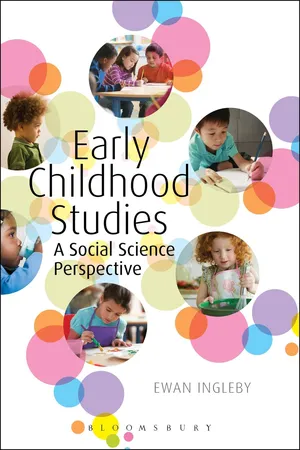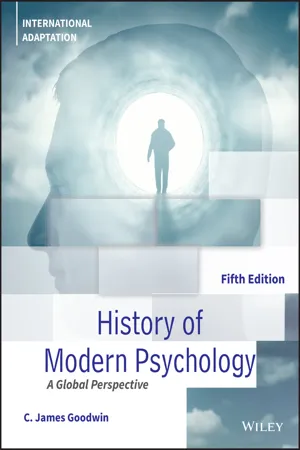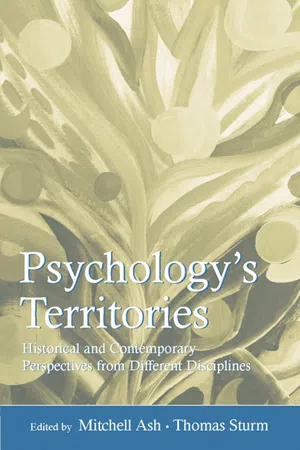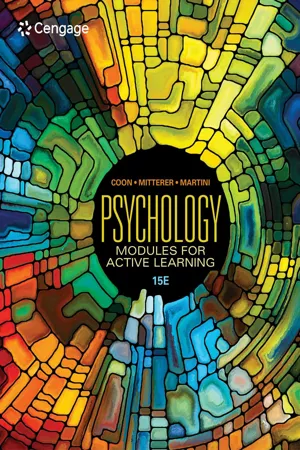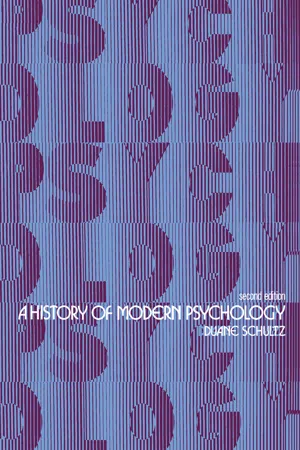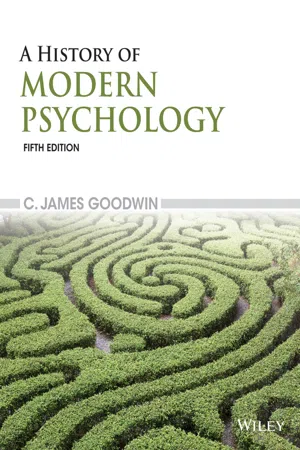Psychology
Introducing Psychology
"Introducing Psychology" is a comprehensive overview of the field, covering topics such as the history of psychology, research methods, and key psychological theories. It explores the complexities of human behavior, cognition, and emotions, providing a foundation for understanding the principles and applications of psychology in various contexts. The book serves as an accessible introduction for students and anyone interested in the study of the mind and behavior.
Written by Perlego with AI-assistance
Related key terms
1 of 5
10 Key excerpts on "Introducing Psychology"
- eBook - ePub
- Willam McDougall(Author)
- 2018(Publication Date)
- Routledge(Publisher)
OUTLINE OF PSYCHOLOGY CHAPTER I INTRODUCTORYPsychology is, or aspires to become, a science, a systematically organized and growing body of knowledge. Entering upon the study of this science, we shall naturally expect to be told what is the class of things or processes with which the science is concerned; what kind of knowledge, what sort of increase of understanding, we may hope to gain from the study of it.The most satisfying answer is that it should help us to a better understanding of human nature. The aim of psychology is to render our knowledge of human nature more exact and more systematic, in order that we may control ourselves more wisely and influence our fellow-men more effectively. There is probably no psychologist who would find serious fault with this statement. As a definition of the province of the science it falls short in two respects. Such a definition should indicate all that falls within the province and should exclude everything that does not. And in both these respects the statement falls short of perfection. For one well-established branch of psychology studies animals, and is properly called the study of animal behavior. And, on the other hand, we have anthropology, a study which by its very title claims to be, and in practice is, the science of mankind; but which, as generally understood, includes much that falls outside the province of psychology. We should not attach great importance to these imperfections; for similar difficulties arise when we attempt to define concisely any science or branch of science. The fields of the various sciences overlap. It is inevitable that they should do so; for, if there are sharp divisions in nature, we do not know exactly where to find them, and therefore cannot draw any precise boundaries between the sciences. And such overlapping of the sciences is really advantageous; for it brings the workers in the several sciences into touch and co-operation one with another. - eBook - PDF
- Douglas Bernstein, , , (Authors)
- 2015(Publication Date)
- Cengage Learning EMEA(Publisher)
Reading this book will give you a fuller un-derstanding of psychology, and we hope that you will find our field as fascinating as we do! This chapter begins our exploration of psychology with a brief look at some of its interrelated specialty areas, or subfields . We then tell the story of how psychology came to be and review several theories and approaches that guide psychologists in their work. We also point out how the activities of psychologists in virtually every subfield are affected by human diversity, especially by age, gender, ethnicity, and other individual characteristics encountered in today’s multicultural societies. THE WORLD OF PSYCHOLOGY: AN OVERVIEW What is psychology and how did it grow? Psychology is the science that studies behavior and mental processes and seeks to apply that study in the service of human welfare. It is a science that covers a lot of territory, as illustrated by the vastly different jobs that occupy the six psychologists we described. They are all psychologists because they are all involved in studying, predicting, improving, or explaining some aspect of behavior and mental processes. Some of the world’s half-million Preview All of the following people hold truly interesting jobs. What do you think they studied to qualify for those jobs? See if you can correctly match each person in the left column with their field of study from the right column. People Fields of Study Anne Marie Apanovitch works for a major drug company and determines which of their marketing strategies are most effective in promoting sales. Engineering Rebecca Snyder studies the giant pandas at Zoo Atlanta in an effort to promote captive breeding and ultimately increase the wild popu-lation of this endangered species. Criminal Justice Michael Moon’s job at a software company is to find new ways to make websites easier for consumers to use. - eBook - PDF
Psychological Science
The Curious Mind
- Catherine A. Sanderson, Karen R. Huffman(Authors)
- 2023(Publication Date)
- Wiley(Publisher)
We strongly agree that psychology in the 21st century should be seen as an integrative, multilevel science—founded on five major pillars (biological, cognitive, developmental, social and personality, and mental and physical health). Copyright © by American Psychological Association. Reproduced with permission. From https://www.apa.org/ed/ precollege/undergrad/introductory-psychology-initiative/including-integrative-themes. No further reproduction or distribution is permitted without written permission from the American Psychological Association. Module 1.2 Why Is Psychology’s History Important? 25 Ch. 3 Neuroscience Ch. 4 Sensation Ch. 5 Consciousness Pillar 1 Biological Ch. 15 Psychological Disorders Ch. 16 Therapies Ch. 17 Health, Stress, and Coping Pillar 5 Mental and Physical Health Pillar 4 Social and Personality Pillar 3 Developmental Ch. 9 Learning Ch. 10 Life Span Development and Language Ch. 6 Cognition and Intelligence Ch. 7 Perception Ch. 8 Memory Pillar 2 Cognitive Psychological Science: The Curious Mind Six Integrative Themes Ch. 11 Motivation, Emotion, and Sexuality Ch. 12 Personality Ch. 13 Social Psychology Ch. 14 Industrial/ Organizational Psychology Foundation Unit: Ch. 1 Introducing Psychology + Ch. 2 Research Methods Foundation Unit: Ch. 1 Introducing Psychology + Ch. 2 Research Methods FIGURE 1.9 (continued) Unfortunately, the awareness that our thoughts, feelings, and behavior are influenced by multiple interacting factors is relatively new within the field of psychology. As you may have noticed, the original pioneering founders of psychology were not very diverse—primarily all Caucasian men! In fact, during the late 1800s and early 1900s, most colleges and universities pro- vided little opportunity for women and people of color, either as students or as faculty members. One of the first women to be recognized in the field of psychology was Mary Calkins. - eBook - PDF
- Lisa J. Cohen(Author)
- 2016(Publication Date)
- Visible Ink Press(Publisher)
What is psychology? Psychology involves the systematic study of mind and behavior. This extremely broad topic covers questions of thought and emotion, normal and abnormal behavior, mental health and mental illness, the individual and the group, and people functioning in their everyday lives. How does psychology relate to everyday life? Psychology relates to every part of everyday life. The questions of psychology relate to how and why we love and suffer and desire, how we raise our children, how and why we succeed or fail at work. Psychology also relates to why we are so fascinated with celebrities and why their marriages so often fail. While the science of psychology may seem abstract at times, the implications touch every arena in which people think, feel, or act. How does psychology interact with biology and sociology? The human mind does not function in isolation. It exists within both a biological and a social context. Therefore psychology serves as an interface between biology, specifically the biology of the brain, and sociology, the study of the behavior of groups. What do psychologists do? Psychology is a remarkably varied field, involving both the performance of scientific research and the application of its findings. Psychologists work as scientists, clinicians, teachers, authors, consultants, and evaluators. They perform empirical research, provide therapy and assessment, and evaluate mental status or disability in numerous settings, such as the government, schools, and the judicial system. Psychologists also consult on wide-ranging problems for businesses, schools, the military, the police force, sports teams and even rock bands. As the study of human behavior, psychology can potentially apply to any field of human endeavor. What is the major professional association of American psychologists? The American Psychological Association (APA) was founded in 1892 and has 134,000 members in 2015. - eBook - PDF
Early Childhood Studies
A Social Science Perspective
- Ewan Ingleby(Author)
- 2012(Publication Date)
- Bloomsbury Academic(Publisher)
Psychology and Early Childhood Studies Chapter outline Introduction 5 Defining the discipline of psychology 5 Origins of psychology 6 The schools of psychology 8 Behaviourism 9 Humanism 11 Psychodynamic theory 12 Cognitive theory 14 Biological psychology 16 Applying psychology to early years 16 Psychological therapies and the early years 24 1 Learning outcomes After reading this chapter you should be able to: identify what the term psychology means; analyse some of the ways that psychology can be used by early years practitioners; critically appraise some of the ways that psychology can be applied to early years. This chapter develops your knowledge and understanding of selected psychological theories accounting for children’s growth and development. The material in the chapter explores the idea that an increased awareness of applied psychology enables children to achieve their full potential. Psychology and Early Childhood Studies 5 Introduction This opening chapter of the book introduces you to the discipline of psychol-ogy and discusses how psychology can be applied to early years in order to improve practice. Each school of psychology has a different understanding of what constitutes the self. This understanding is outlined, analysed and criti-cally appraised in order to explore how psychology can be applied to the early years. Throughout the chapter there are formative activities that reinforce learning in relation to the main psychological models that are of relevance for early years practitioners. Defining the discipline of psychology Reflective Activity 1.1 What is your understanding of the word psychology? Feedback Psychology is an academic discipline that studies a vast range of human and animal behaviour. Psychologists are not mind readers and they do not necessarily have access to our thoughts. They do not work solely with people who are mentally ill or people who are emotionally disturbed. - eBook - PDF
History of Modern Psychology
A Global Perspective
- C. James Goodwin(Author)
- 2023(Publication Date)
- Wiley(Publisher)
By the time you reach the final chapter of this text, where the issue of psychology’s increased specialization is again addressed, you will have learned enough to begin understanding the interconnectedness among the different areas of psychology. 6 CHAPTER 1 Introducing Psychology’S HISTORY Fourth, an understanding of psychology’s history makes one a more critical thinker. By being aware of the history of various treatments for psychological disorders, for example, the discerning student is better able to evaluate modern claims for some “revolutionary breakthrough” in psychotherapy. A close examination of this allegedly unique therapy might reveal similarities to earlier approaches. The historically literate student also is aware that on many other occasions, initial excitement over a flashy new therapy (e.g., lobotomy) is tempered by a later failure to find convincing evidence that it works. Similarly, knowing history makes one skeptical about “large claims” (Helson, 1972), for example, the recent idea that all psychology can be known by understanding the brain and that neuropsychology, therefore, is the future of psychology. Those with an understanding of history will recognize the similarity to claims made in the 19th century about phrenology, will recognize that a brain scan showing activity in area X when a person is lying does not explain lying, and will understand why neuropsychology is sometimes referred to as the new phrenology (Satel & Lilienfeld, 2013). Finally, the history of psychology course may be a history course, but it is also a psychology course. Thus, one of its goals is to continue educating about human behavior. Studying historical individuals as they helped develop the science of psychology can only increase our understanding of what makes people behave the way they do. - eBook - ePub
Psychology's Territories
Historical and Contemporary Perspectives From Different Disciplines
- Mitchell Ash, Thomas Sturm(Authors)
- 2007(Publication Date)
- Psychology Press(Publisher)
Psychology’s boundaries have continuously been contested in various ways—by neighboring disciplines, by everyday psychological view points, and by practical approaches to solving psychological problems coming from outside the field. Traditionally, questions concerning the identity of psychology and its demarcation from other domains have been discussed by referring to psychology’s subject matter or method; but the obvious multiplicity of the discipline’s subjects and methods makes this approach difficult to sustain. The authors of this volume take a novel approach to this issue by focusing on a broad range of specific questions: How have psychological concepts been understood indifferent disciplines such as psychology, philosophy, neuroscience, or the social sciences, as well as in daily life? What instruments have been used in research on the mind, coming from what sources, and with what potentials and limits for defining and solving specifically psychological problems? And how have applications of psychological thinking and research worked in various technological and personal contexts? Using focused historical and contemporary case studies, the authors reflect critically on traditional images of psychology as a scientific discipline and as a professional practice. The volume thus has a dual agenda: to make historical and philosophical studies of psychology relevant to contemporary concerns, and to show how psychology can profit from better interdisciplinary cooperation, thus improving mutual understanding between different scientific cultures.The time is ripe for such an effort, but there is no clear agreement on how to proceed. The historiography of psychology, for example, has be come part of the general history of science, due in large part to the common efforts of historically aware psychologists, general historians and historians of science to contextualize the discipline’s varied development in different places and times (for surveys, see Ash, 2003, and Smith, 1998). In turn, the history of science has professionalized at a rapid pace in the past 20 years. Scholars in the field now generally recognize that research in this area cannot be limited either to technical histories of individual scientific disciplines, as constructed by the members of these disciplines (although such studies continue to be of value); nor can it be limited to the histories of scientific disciplines as institutions, of the kind most familiar to general and social historians, and often practiced by historians of psychology as well. Alongside these approaches, a vast variety of contextualizations of science has appeared, ranging from studies of cultures of scientific research at the micro-level to cultural histories of central scientific concepts, including even the concept of objectivity, at the metalevel. - eBook - PDF
Psychology
Modules for Active Learning
- Dennis Coon, John Mitterer, Tanya Martini, , Dennis Coon, John Mitterer, Tanya Martini, (Authors)
- 2021(Publication Date)
- Cengage Learning EMEA(Publisher)
Also, psychologists around the world are now researching, teaching, and helping people in a wide range of specialties. In this module, we survey the whole of psychology from its beginnings until now. After reading this module you should be able to: 3.1 Distinguish between the following historical approaches to psychology: Structuralism, functionalism, behavior-ism, gestalt psychology, psychoanalytic psychology, hu-manistic psychology, and cognitive psychology, as well as address the importance of diversity in psychology 3.2 Define the three contemporary perspectives in psychol-ogy and explain why they are complementary 3.3 Discuss some of the major specialties in modern psy-chology, including the distinction between researchers and clinicians ~LEARNING OUTCOMES~ Universal History Archive/Universal Images Group/Getty Images A Brief History of Psychology—Psychology’s Family Album Learning Outcome 3.1 Distinguish between the following historical approaches to psychology: Structuralism, functional-ism, behaviorism, gestalt psychology, psychoanalytic psychol-ogy, humanistic psychology, and cognitive psychology, as well as address the importance of diversity in psychology As we noted previously, people have been observing human behavior and philosophizing about it informally for thou-sands of years. Yet most historians now agree that scientif-ic psychology truly took hold in the late 1800s in Leipzig, Germany (Kardas, 2014). There, in 1879, Wilhelm Wundt Copyright 2022 Cengage Learning. All Rights Reserved. May not be copied, scanned, or duplicated, in whole or in part. Due to electronic rights, some third party content may be suppressed from the eBook and/or eChapter(s). Editorial review has deemed that any suppressed content does not materially affect the overall learning experience. Cengage Learning reserves the right to remove additional content at any time if subsequent rights restrictions require it. - eBook - PDF
- Duane Schultz(Author)
- 2013(Publication Date)
- Academic Press(Publisher)
1 The Study of the History of Psychology Introduction The antecedents of modern psychology can be traced to the earliest of inquiring minds. Man seems always to have been fascinated by his own behavior, and ruminations on human nature and conduct fill many philosophical and theological volumes. Broadly speaking, the same kinds of questions now asked about the nature of man were asked centuries ago. The important difference between modern psychology and its intel-lectual precursors is not so much the kinds of questions asked as the methods used to seek the answers. Until the last quarter of the nineteenth century, man attempted to study himself by speculation, intuition, and generalization from his own experiences. The major change or breakthrough occurred when man tried to answer his questions about human nature by using the tools and methods of science, which had already been demonstrated successful in answering questions in the natural sciences. When man tried to use carefully controlled observation and experimentation to study human nature, then and only then did psychology begin to attain some indepen-dence from its philosophical antecedents. In order to break away from philosophy, psychology had to develop a more precise and objective way of dealing with its problems than 2 THE STUDY OF THE HISTORY OF PSYCHOLOGY its forebears had used. Much of the history of psychology after its break with philosophy involves, as we shall see, the continuing refinement of its tools, techniques, and methods of study in order to achieve increased precision and objectivity in both its answers and questions. The first sign of a distinct field of inquiry known as psychology, then, was the adoption, in the last quarter of the nineteenth century, of the scientific method as the means for attempting to solve its problems. During that period there were several formal indications that psychology was beginning to flourish. - eBook - PDF
- C. James Goodwin(Author)
- 2015(Publication Date)
- Wiley(Publisher)
CHAPTER 1 Introducing Psychology’S HISTORY History isn’t just something that’s behind us; it’s also something that follows us. —Henning Mankill, 2011 PREVIEW AND CHAPTER OBJECTIVES This chapter opens by describing why it is important to know about psychology’s history. A contrast is drawn between traditional histories of psychology, which emphasize the contributions of distinguished psychologists, the outcomes of famous experiments, and the debates among adherents of different “schools” of psychology, and a newer approach, which tries to situate events and people in a broader historical context. This chapter also considers the methods used by historians to conduct research in history and the problems they face when constructing historical narratives from available data. After you finish this chapter, you should be able to: ■ Describe the events during the 1960s that led to a renewed interest in psychology’s history among psychologists ■ Explain why it is important for everyone to have some understanding of history ■ Explain why it is especially important for psychology students to understand psychology’s history ■ Distinguish between “old” and “new” history, as Furumoto used the terms ■ Understand the concept of an origin myth, and explain the purpose such myths serve ■ Distinguish between presentist and historicist views of history, and articulate the dangers of presentist thinking ■ Distinguish between internal and external histories of psychology, and describe the benefits of examining each ■ Distinguish between personalistic and naturalistic approaches to history ■ Define historiography and describe the various selection and interpretation problems faced by historians when they do their work ■ Explain how the process of doing history can produce some degree of confidence that a measure of truth has been attained 1 2 CHAPTER 1 Introducing Psychology’S HISTORY WHY TAKE THIS COURSE? Psychologists have always been interested in the history of their discipline.
Index pages curate the most relevant extracts from our library of academic textbooks. They’ve been created using an in-house natural language model (NLM), each adding context and meaning to key research topics.




